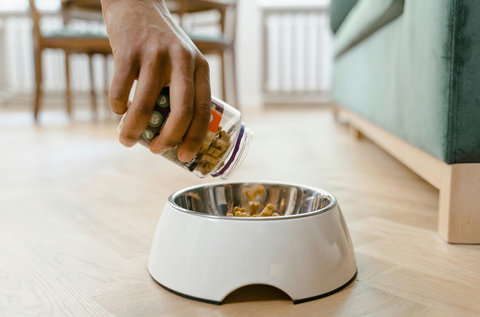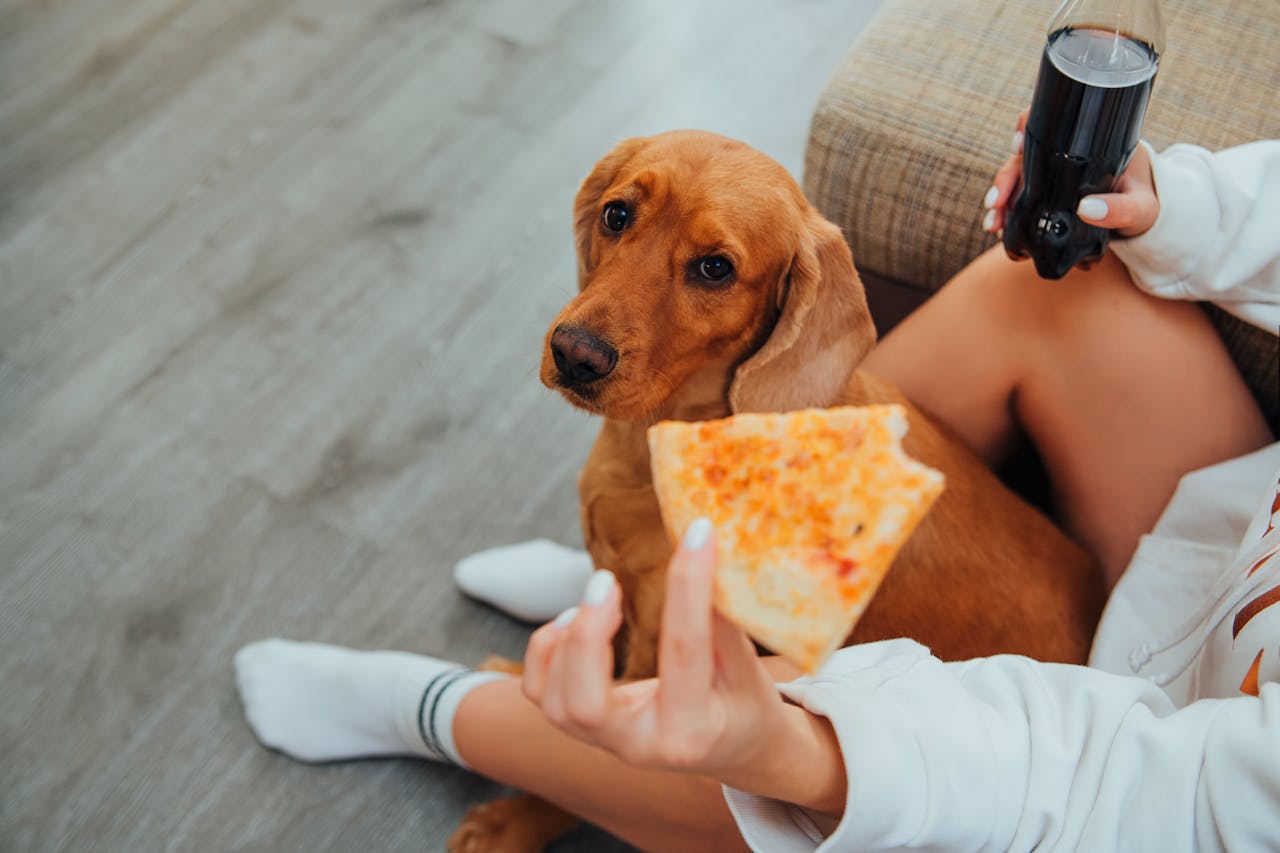When you're relishing a delicious meal, it's hard to ignore those pleading, soulful eyes looking up at you. You know the ones. Your dog's, “Hey, that sure looks good. You're my favorite human. If you loved me, you'd share.” But giving your dog table scraps isn't a good idea (no matter how happy it makes your pup feel at the moment.)
Feeding table food to your pup isn't a healthy or safe practice. Plenty of human foods are toxic to dogs, cause tummy problems, and can also lead to weight issues. And if you make it a habit, it's one that's hard for you and your dog to break.
Five Vital Reasons You Shouldn't Give Your Dog Table Food
It's natural to want to toss your dog a few tasty bits from your plate. After all, aren't you supposed to share with your best friend? But here are five excellent reasons why you shouldn't give your dog table scraps.
1. Many Human Foods Are Toxic to Dogs
One of the biggest reasons to avoid giving people food to your dog is that it isn't safe. Many human foods are toxic to dogs, causing severe reactions like anemia, kidney failure, and in the worst cases, death. Things like grapes, chocolate, onions, alcohol, raisins, and various nuts can lead to significant problems for your pet.
Also, even if a food appears dog-friendly at first glance, it’s important to remember that in prepared meals you don’t always know all the ingredients. Several components in the dish may not be good for your dog. For example, onions and garlic are extremely popular seasonings that are bad for dogs. Also, sugar-free products containing Xylitol pose hazards to your pup.
2. Creates Bad Habits
You may not mind your dog begging for scraps or pawing at your leg while you’re eating. But what about when you have dinner guests? Or when you want to bring your pup along on a visit to a dog-friendly café? If your precious pup is used to asking for table scraps and getting them, it’s not their fault if they do so in public.
Dogs form bad habits, just like people do, and begging for food is a common example. Also, like most bad habits, it’s a tough one to break, for you and your dog. Your dog is used to begging and getting a reward, and you may be used to tossing a few tidbits from your dish without a second thought.
Not only could this be off-putting behavior to other people, but it could also be frustrating when you’re trying to enjoy a nice meal. It’s also unsafe for your dog, because if they beg others for food, well-intentioned people may give into those puppy-dog eyes.
But what if those people have no idea what foods are okay for your dog to eat? Someone may unwittingly give your dog something dangerous, and you may be none the wiser until your dog starts having a reaction.
3. Contributes to Weight Gain and Obesity
Obesity in dogs leads to lots of problems, inducing arthritis, pancreatitis, kidney issues, and a lower quality of life. Excessive weight gain or obesity is a problem for approximately 59% of dogs in the United States, according to the Association for Pet Obesity and Prevention. Feeding your dog table scraps contributes to weight gain because your pup is likely eating the scraps in addition to their regular meals.
It’s also likely that the people food you’re giving your pup is a lot more calorie-dense than their typical dog treats. The general rule of thumb is that your dog’s treats should only make up roughly 10% of their daily calories. This number can vary slightly based on your dog’s specific needs, so your vet can give you a more precise measure for your pup.
4. Causes Digestive Issues and Gastrointestinal Problems
Although there are human foods that aren’t poisonous for pups, there are still many that cause unpleasant side effects. Your dog's digestive system doesn’t work exactly like a human’s. Therefore, your dog may struggle to digest overly rich or fatty foods, leading to diarrhea or vomiting.
Heavily seasoned foods can lead to gastrointestinal discomfort. Foods that are high in sodium can cause problems for your pooch, like salt toxicosis, which affects brain tissue among other things.
5. Likelihood of Ingesting Bones
Another potential hazard of tossing table scraps to your dog is bone splinters. Your dog could choke on a bone fragment. Pieces of bone could cause tears or other problems as they make their way through your dog’s digestive tract.
In some cases, the bone pieces get stuck in the intestine or bowels, leading to severe discomfort and dangerous conditions. When a bowel obstruction or similar problem occurs, sometimes your only choice is for a vet to remove the bone surgically.

Safe Ways to Treat Your Dog with Human Food
It’s not that dogs can never eat human food. For example, many people give their pups certain dog-safe foods as extra-special treats or use specific foods to create DIY dog treats. Pet parents who make homemade dog food use people's food to do so (hopefully, under the guidance of a dog nutritionist or vet).
But there’s a way to allow your dog to enjoy human food that is safe and healthy. Here are a few tips.
1. Choose Foods That Are Non-Toxic and Healthy for Dogs
Before giving your dog any human food, make sure it is not toxic to your pup. When in doubt, ask your vet directly. Additionally, avoid overly-processed, fatty, or highly-seasoned foods. Single-ingredient foods, like blueberries, bananas, or plain, cooked chicken are good examples.
2. Don't Feed Your Dog from Your Plate
Avoid creating a begging habit by only giving your dog people food snacks when you aren’t eating them too. Serve them to your pup at a separate time, or put some in their bowl.
Other options are some peanut butter on a treat mat or inside a treat toy like the Rolly Cannoli. But do not hand your pup food from your plate as you’re eating.
3. Give Appropriate Foods in Moderation
No matter what you feed your dog, always do so in moderation. Only give human food in small amounts that fall within your dog’s regular caloric needs. Save them for special occasions or super rewards instead of feeding them to your pup every day.
If you’re unsure of how many treats your dog can have, ask your vet. As previously mentioned, treats shouldn't make up more than 10% of your dog’s diet. However, certain factors, including age, weight, overall health, etc. can alter this figure.
Dogs and Table Scraps Don't Mix
Some pet parents explicitly avoid giving their dogs any human food. Others treat their dog to a special treat on occasion. It’s your preference. But no matter which way the cookie crumbles, it shouldn’t do so from your plate into your pup’s mouth. (And cookies aren’t the best choice for your dog, anyway.)
If you’re okay with giving your dog human food, do so in a way that is safe and healthy for your pup. For more helpful tips on making your dog’s life the best that it can be, check out the rest of the Neater Pets blog.

